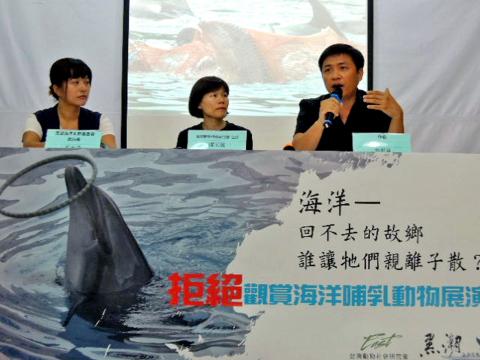Animal protection groups yesterday urged the public to boycott shows featuring whales and dolphins, and called for increased public awareness about the number of cetaceans being captured, traded or slaughtered worldwide.
Environmental and Animal Society of Taiwan director Chen Yu-min (陳玉敏) told a news conference in Taipei that cetacean poaching is the most rampant in the waters off the town of Taiji in Wakayama Prefecture, Japan, where as many as 400,000 small cetaceans were captured or slaughtered over the past 20 years.
Chen said Japan is the world’s largest exporter of cetaceans and that by purchasing these animals, Taiwanese recreational facilities have become accomplices in a “cruel” industry.

Photo: Hsieh Wen-hua, Taipei Times
Citing the Farglory Ocean Park in Hualien County as an example, she said the park purchased 17 cetaceans from Japanese dealers between 2002 and 2005, and ordered 13 more in 2010.
Even though the Forestry Bureau stepped in to block the sales, citing high mortality rates and poor living conditions at the facility, the incident revealed the challenges that other cetaceans face at local recreational parks, including 21 California sea lions, 18 common bottlenose dolphins, four South American fur seals, four white whales, one Risso’s dolphin and one African manatee, the activists said.
“As long as people continue to attend these shows, the cruelty against cetaceans will never cease,” she said.
Citing a special act in the UK governing the living space of cetaceans at zoos, which stipulates that at least 1,000m3 be allotted per five cetaceans kept by zoos and that another 200m3 be allocated with each additional cetacean, she said that three of the 11 dolphins at Yehliu Ocean World in New Taipei City share a space of just 288m3, with the others being confined to two tiny pools each measuring 236m3.
“These appalling living environments have a very detrimental effect on the dolphins, such as impairing their ability to tell directions and feed crop milk,” she said.
Environment and Animal Society of Taiwan chief executive Chu Tseng-hung (朱增宏) said that the nation lacks a law dedicated to the care and maintenance of marine animals.

A preclearance service to facilitate entry for people traveling to select airports in Japan would be available from Thursday next week to Feb. 25 at Taiwan Taoyuan International Airport, Taoyuan International Airport Corp (TIAC) said on Tuesday. The service was first made available to Taiwanese travelers throughout the winter vacation of 2024 and during the Lunar New Year holiday. In addition to flights to the Japanese cities of Hakodate, Asahikawa, Akita, Sendai, Niigata, Okayama, Takamatsu, Kumamoto and Kagoshima, the service would be available to travelers to Kobe and Oita. The service can be accessed by passengers of 15 flight routes operated by

GIVE AND TAKE: Blood demand continues to rise each year, while fewer young donors are available due to the nation’s falling birthrate, a doctor said Blood donors can redeem points earned from donations to obtain limited edition Formosan black bear travel mugs, the Kaohsiung Blood Center said yesterday, as it announced a goal of stocking 20,000 units of blood prior to the Lunar New Year. The last month of the lunar year is National Blood Donation Month, when local centers seek to stockpile blood for use during the Lunar New Year holiday. The blood demand in southern Taiwan — including Tainan and Kaohsiung, as well as Chiayi, Pingtung, Penghu and Taitung counties — is about 2,000 units per day, the center said. The donation campaign aims to boost

ENHANCING EFFICIENCY: The apron can accommodate 16 airplanes overnight at Taoyuan airport while work on the third runway continues, the transport minister said A new temporary overnight parking apron at Taiwan Taoyuan International Airport is to start operating on Friday next week to boost operational efficiency while the third runway is being constructed, the Ministry of Transportation and Communications said yesterday. The apron — one of the crucial projects in the construction of the third runway — can accommodate 16 aircraft overnight at the nation’s largest international airport, Minister of Transportation and Communications Chen Shih-kai (陳世凱) told reporters while inspecting the new facility yesterday morning. Aside from providing the airport operator with greater flexibility in aircraft parking during the third runway construction,

American climber Alex Honnold is to attempt a free climb of Taipei 101 today at 9am, with traffic closures around the skyscraper. To accommodate the climb attempt and filming, the Taipei Department of Transportation said traffic controls would be enforced around the Taipei 101 area. If weather conditions delay the climb, the restrictions would be pushed back to tomorrow. Traffic controls would be in place today from 7am to 11am around the Taipei 101 area, the department said. Songzhi Road would be fully closed in both directions between Songlian Road and Xinyi Road Sec 5, it said, adding that bidirectional traffic controls would